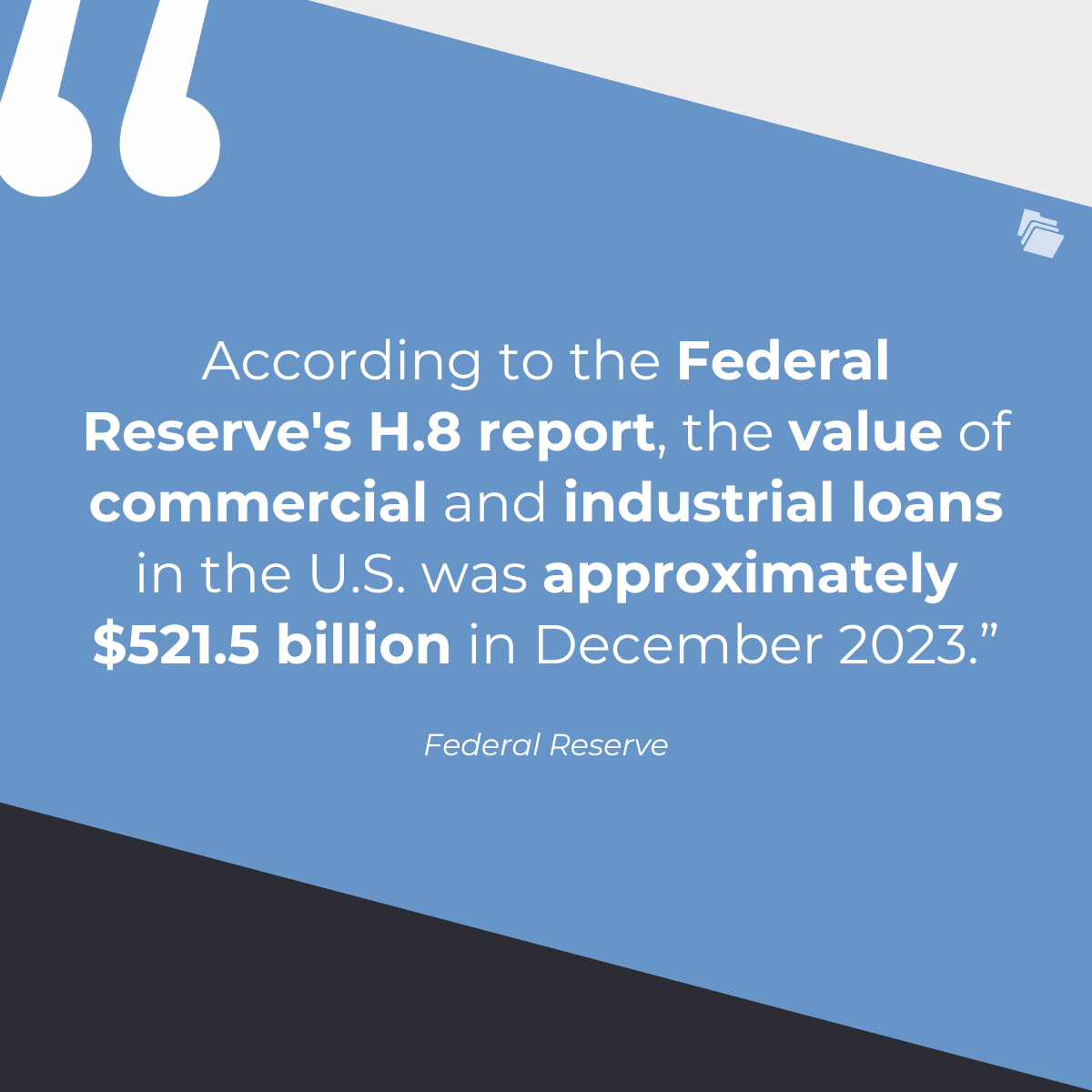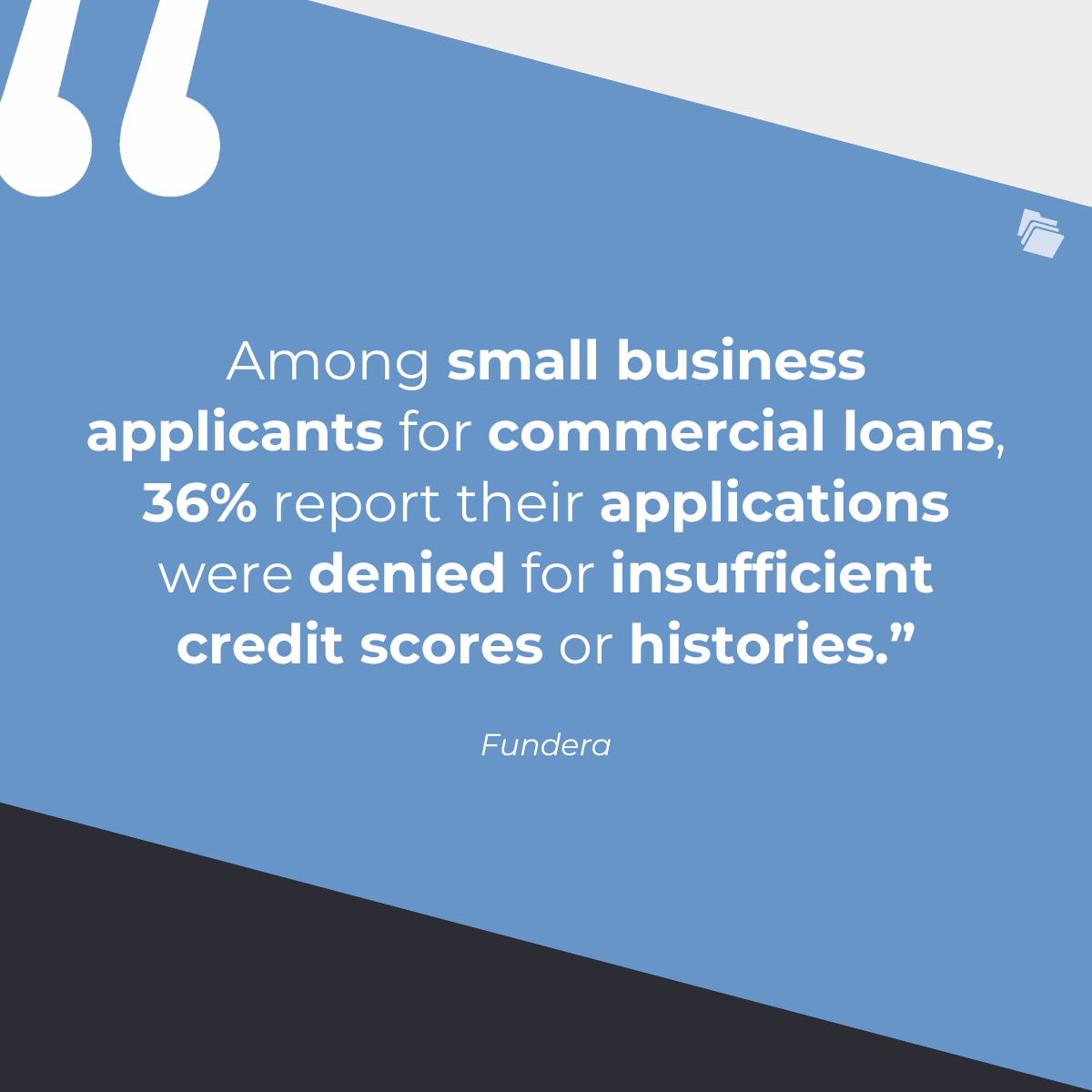The simplest answer to the question “What is a commercial loan?” or “How do commercial loans work?” is that commercial loans are essential finance instruments in modern economies that offer significant capital to businesses for major investments and operational expenses.
Distinct from business loans — which are typically aligned with shorter-term financial needs — commercial loans are architected to support large-scale financial undertakings. These loans come with extended repayment tenures and substantial loan amounts, aligning seamlessly with the strategic goals of businesses, whether for scaling operations or for the acquisition of significant assets such as real estate or machinery.
The role of commercial loans in the economy is substantial. According to the Federal Reserve's H.8 report, the value of commercial and industrial loans in the U.S. was approximately $521.5 billion in December 2023. This figure emphasizes the critical role these loans play in empowering businesses, supporting significant projects, and contributing to economic growth. For companies seeking to expand or undertake major initiatives, understanding commercial loans is a key element in securing long-term success and stability in a competitive market.

Demystifying Commercial Loans: How They Work and What You Need to Know
The commercial loan process begins with an application, where applicant businesses provide extensive financial documentation, including:
- Detailed financial statement
- Business plans
- Credit histories
Lenders assess applications to evaluate a company’s financial health, revenue consistency, and ability to meet loan terms. This evaluation typically involves an in-depth review of profit and loss statements, cash flow records, and balance sheets.
Once applications are approved, the lender and the applicant establish the terms of the loan, detailing:
- Loan amount
- Interest rate
- Repayment schedule
- Required collateral
Collateral is often necessary for commercial loans and serves as security for the lender. Collateral for commercial loans may be business assets, real estate, or equipment. Interest rates may be fixed or variable, depending on factors such as the borrower's creditworthiness, overall loan value, and prevailing market conditions.
After agreeing on terms, lending institutions disburse the loan funds. Businesses usually receive the loan in a lump sum and begin repayment based on a predetermined schedule, typically distributed over several years. It's noteworthy that commercial loans typically feature more stringent repayment schedules and higher interest rates than personal loans due to the larger loan amounts and increased lender risk.
Exploring Your Options: A Deep Dive into the Different Types of Commercial Loans
Commercial loans come in various forms, each designed to meet different kinds of business needs. From purchasing essential equipment to acquiring real estate or vehicles, these loans offer the financial support businesses require to grow and thrive. Understanding the different types of commercial loans can help companies make informed decisions based on their unique financial situations and objectives.
1. Equipment Financing
Equipment financing loans are specifically for purchasing business equipment. Borrowers use the equipment as collateral, which helps secure lower interest rates. The loan amount typically covers up to 100% of equipment costs, allowing businesses to lay aside cash for other expenses.
2. Commercial Real Estate Loans
Tailored for the acquisition or development of commercial property, these loans are secured by the property. Terms can vary significantly based on the property type and the borrower's creditworthiness. To qualify, businesses must occupy 51% of the building being purchased.
3. Commercial Auto Loans
Designed for the purchase of business vehicles, commercial auto loans are secured by the purchased vehicle. They offer a way for businesses to acquire vehicles they need without paying the full price upfront.
4. Commercial Construction Loans
These loans provide funding for the construction or renovation of commercial properties. They are typically short-term and may have higher interest rates than most other business loan types because of the inherent risks associated with construction projects.
5. Commercial Bridge Loans
Bridge loans provide short-term financing for business needs while businesses seek longer-term financing arrangements. These loans are common in real estate transactions, providing immediate cash flow.
6. Commercial Hard Money Loans
Hard money loans are short-term loans based on the value of property assets rather than the borrower’s creditworthiness. They are typically used in real estate transactions when borrowers need quick financing or when traditional lenders are not a viable option.
Navigating the Lending Landscape: Where to Find the Best Commercial Loans
Securing a commercial loan is a crucial step for businesses starting up or aiming to expand. A variety of institutions offer commercial loans, with varying types of terms and conditions. Identifying the right kind of lender for your business is critical to ensure you receive favorable terms aligned with your business goals and capabilities.
1. Banks and Credit Unions
Traditional banks and credit unions are the most common type of commercial lenders. They offer a range of products with competitive interest rates and terms. Credit unions may provide more personalized service and potentially better rates due to their non-profit status. Overall, commercial lending through banks and credit unions contributes significantly to the well-being of the economy. As of 2023, these institutions in the U.S. held commercial and industrial loans totaling approximately $2.8 trillion.
2. U.S. Small Business Administration (SBA)
The Small Business Administration (SBA) offers several loan programs focused on supporting small businesses. SBA loans are backed by the government, reducing the risk for lenders and securing lower interest rates and more favorable terms for borrowers. The SBA 7(a) loan program, for instance, is popular among small businesses for its flexibility and range of uses.
3. Non-Bank Lenders
Non-bank lenders, such as online lenders, offer commercial loans with often quicker application processes and less stringent requirements than traditional banks. While these lenders may provide faster access to funds, businesses should carefully consider the terms, as their interest rates are typically higher than those offered by other lenders. These lenders cater to businesses that may be unqualified for traditional bank loans due to various reasons, such as short business history or lower credit scores.
Selecting the right lender requires a thorough evaluation of the business's financial situation, the purpose of the loan, and the terms offered by each lender. Businesses should consider not only the interest rates but also the repayment terms, any associated fees, and the lender's reputation for customer service.
Achieving Success: Step-by-Step Guide to Obtaining a Commercial Loan
Securing a commercial loan is a relatively straightforward process designed to ensure businesses meet lender requirements. A well-prepared approach enhances the likelihood of approval and favorable loan conditions.
1. Understand Your Business Needs
Clearly define the purpose of the loan and the amount needed. This clarity assists in selecting the right loan type and lender.
2. Prepare Documentation
Compile financial statements, tax returns, business plans, and cash flow projections. Lenders scrutinize these documents to assess risk and repayment capacity. Among small business applicants for commercial loans, 36% report their applications were denied for insufficient credit scores or histories.

3. Assess Your Creditworthiness
Improve your credit score if needed, as it significantly influences loan terms. Lenders favor businesses with strong credit histories and reliable income streams.
4. Explore Options
Consider various lenders, including banks, credit unions, and non-bank lenders, to find the best terms.
5. Apply and Negotiate
Submit your application and be prepared to negotiate terms. Clear communication and a solid understanding of your financial standing are key.
Process Commercial Loans up to Six Times Faster with FileInvite
FileInvite’s secure document collection and portal platform streamlines commercial loan application processes. With secure portals and automated notifications, FileInvite allows lenders and borrowers to communicate in real time, eliminating costly downtime in application processing. Join the leading lenders who trust FileInvite for a streamlined lending experience.
To learn more and request a demo, visit FileInvite today.

Related Posts: